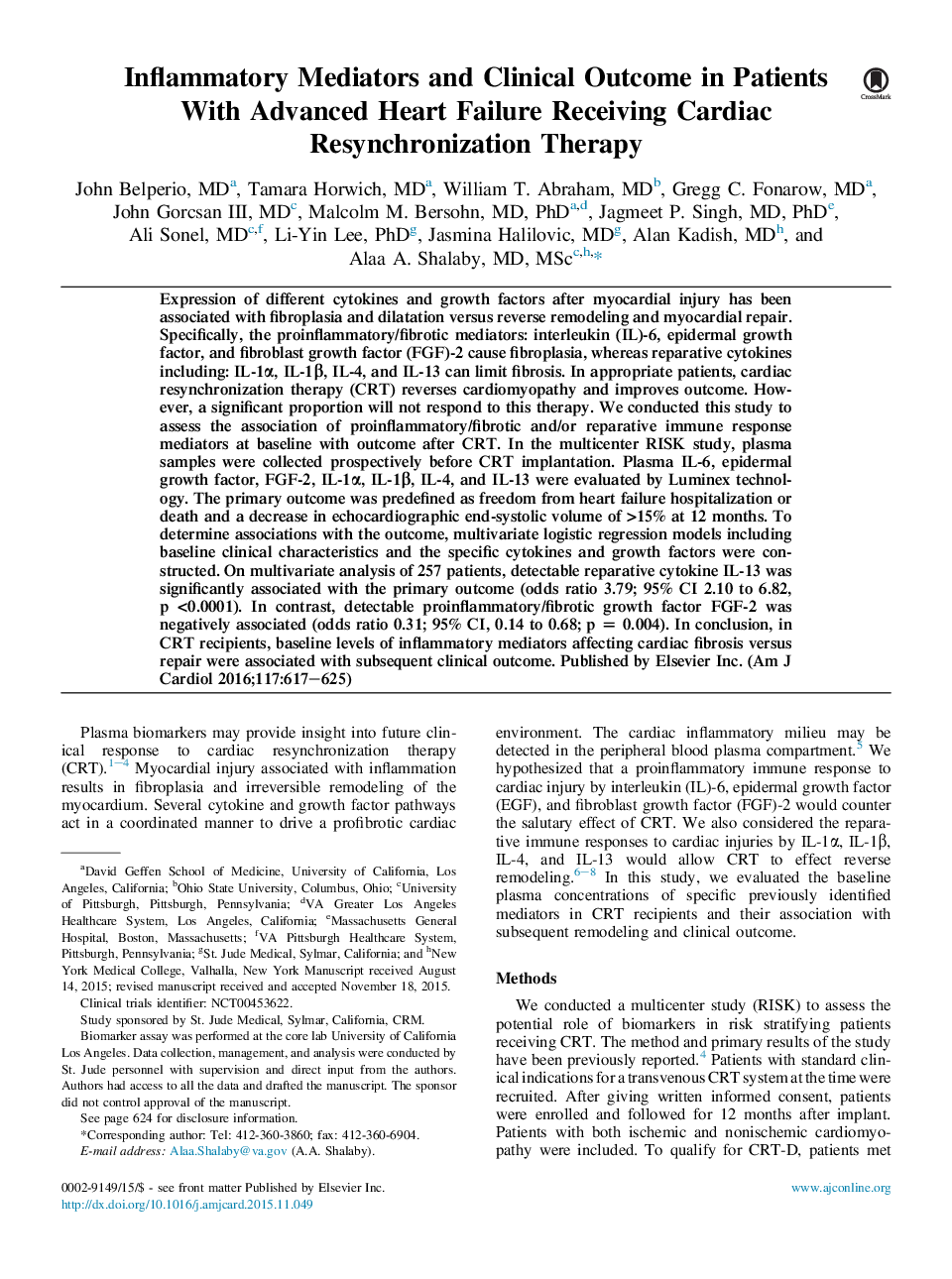| کد مقاله | کد نشریه | سال انتشار | مقاله انگلیسی | نسخه تمام متن |
|---|---|---|---|---|
| 5930083 | 1572119 | 2016 | 9 صفحه PDF | دانلود رایگان |
عنوان انگلیسی مقاله ISI
Inflammatory Mediators and Clinical Outcome in Patients With Advanced Heart Failure Receiving Cardiac Resynchronization Therapy
ترجمه فارسی عنوان
میانجیگرهای التهابی و نتیجه بالینی در بیماران مبتلا به نارسایی پیشرفته قلب دریافت درمان مجدد قلب
دانلود مقاله + سفارش ترجمه
دانلود مقاله ISI انگلیسی
رایگان برای ایرانیان
موضوعات مرتبط
علوم پزشکی و سلامت
پزشکی و دندانپزشکی
کاردیولوژی و پزشکی قلب و عروق
چکیده انگلیسی
Expression of different cytokines and growth factors after myocardial injury has been associated with fibroplasia and dilatation versus reverse remodeling and myocardial repair. Specifically, the proinflammatory/fibrotic mediators: interleukin (IL)-6, epidermal growth factor, and fibroblast growth factor (FGF)-2 cause fibroplasia, whereas reparative cytokines including: IL-1α, IL-1β, IL-4, and IL-13 can limit fibrosis. In appropriate patients, cardiac resynchronization therapy (CRT) reverses cardiomyopathy and improves outcome. However, a significant proportion will not respond to this therapy. We conducted this study to assess the association of proinflammatory/fibrotic and/or reparative immune response mediators at baseline with outcome after CRT. In the multicenter RISK study, plasma samples were collected prospectively before CRT implantation. Plasma IL-6, epidermal growth factor, FGF-2, IL-1α, IL-1β, IL-4, and IL-13 were evaluated by Luminex technology. The primary outcome was predefined as freedom from heart failure hospitalization or death and a decrease in echocardiographic end-systolic volume of >15% at 12 months. To determine associations with the outcome, multivariate logistic regression models including baseline clinical characteristics and the specific cytokines and growth factors were constructed. On multivariate analysis of 257 patients, detectable reparative cytokine IL-13 was significantly associated with the primary outcome (odds ratio 3.79; 95% CI 2.10 to 6.82, p <0.0001). In contrast, detectable proinflammatory/fibrotic growth factor FGF-2 was negatively associated (odds ratio 0.31; 95% CI, 0.14 to 0.68; p = 0.004). In conclusion, in CRT recipients, baseline levels of inflammatory mediators affecting cardiac fibrosis versus repair were associated with subsequent clinical outcome.
ناشر
Database: Elsevier - ScienceDirect (ساینس دایرکت)
Journal: The American Journal of Cardiology - Volume 117, Issue 4, 15 February 2016, Pages 617-625
Journal: The American Journal of Cardiology - Volume 117, Issue 4, 15 February 2016, Pages 617-625
نویسندگان
John MD, Tamara MD, William T. MD, Gregg C. MD, John MD, Malcolm M. MD, PhD, Jagmeet P. MD, PhD, Ali MD, Li-Yin PhD, Jasmina MD, Alan MD, Alaa A. MD, MSc,
